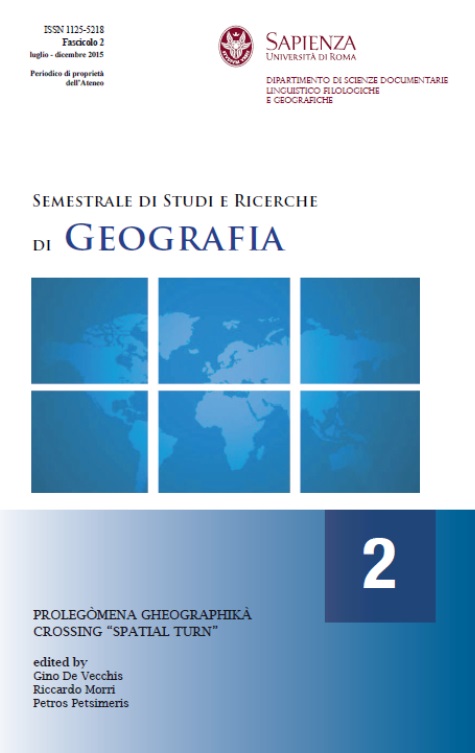La svolta spaziale nel pensiero giuridico. Un’introduzione
DOI:
https://doi.org/10.13133/1125-5218.15092Abstract
The spatial turn in contemporary juridical thought. An introduction
This article highlight the plurality of contemporary thought movements that helped bring out, even within the legal culture, the so-called spatial turn. It is provided under interdisciplinary between law & geography and emerges strongly in the last twenty years, first in the United States and Canada and then more recently in Europe. The contribution of Lefebvre and Foucault were eminent even within juridical spatial turn. They mark a turn for the emancipation of category space from its subordination to time and reveal the ambiguity of the use of space which can subscribe fully between the instruments of domination and governmentality but also represents a material or immaterial re-appropriation tool for individual or collective subject. It will be from the 80s, through the iconoclasm of Critical Legal Studies, that the relationship between space and the right re-surfaces with force in parallel with an evidence of indeterminacy and ambiguity of the law. Since then, several works based
on an interdisciplinary approach are published and, more recently, the field of the so-called Critical Legal Geography – a real project of interdisciplinary studies – has been developed.
Le tournant spatial dans la pansée juridique contemporaine. Une introduction
Cette contribution mets en évidence la pluralité des mouvements de la pensée
contemporaine qui ont contribue à l’émergence, au sein même de la culture juridique, du spatial turn. Cette tournante est directement lié à ’interdisciplinarité entre le droit et la géographie et a émerge fortement dans les vingt dernières années, d’abord aux États-Unis et au Canada, puis, plus récemment, en Europe. Les analyse de Lefebvre et de Foucault restent centrales mémé pour le tournant spatial dans la légal theory. Ils déterminent un point de non-retour pour l’émancipation de l’espace de sa subordination au temps et au même temps révèlent l’ambiguïté de l’utilisation de l’espace qui peut s’inscrire pleinement parmi les instruments de la domination et de la gouvernamentalité, mais il peut représenter, aussi, outil de réappropriation symbolique et matérielle pour le sujet individuel et collectif. La relation étroite entre l’espace et le droit ré-émergera dans les années ’80, grâce à la puissance iconoclaste de Critical Legal Studies et en parallèle avec la progressive mise en évidence de l’ambiguïté du droit. Depuis de nombreux travaux interdisciplinaires sont publiés et, plus récemment, le domaine de la Critical Legal Geography, véritable projet d’études interdisciplinaires portant sur les interaction entre droit et espace, a été ouvert.
##submission.downloads##
Pubblicato
Fascicolo
Sezione
Licenza
Gli autori che pubblicano su questa rivista accettano le seguenti condizioni:- Gli autori mantengono i diritti sulla loro opera e cedono alla rivista il diritto di prima pubblicazione dell'opera, contemporaneamente licenziata sotto una Licenza Creative Commons - Attribuzione che permette ad altri di condividere l'opera indicando la paternità intellettuale e la prima pubblicazione su questa rivista.
- Gli autori possono aderire ad altri accordi di licenza non esclusiva per la distribuzione della versione dell'opera pubblicata (es. depositarla in un archivio istituzionale o pubblicarla in una monografia), a patto di indicare che la prima pubblicazione è avvenuta su questa rivista.
- Gli autori possono diffondere la loro opera online (es. in repository istituzionali o nel loro sito web) prima e durante il processo di submission, poiché può portare a scambi produttivi e aumentare le citazioni dell'opera pubblicata (Vedi The Effect of Open Access).


